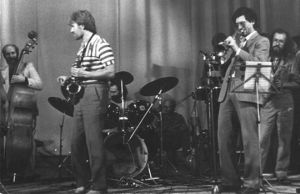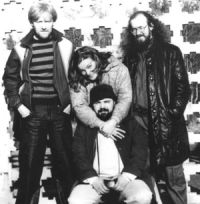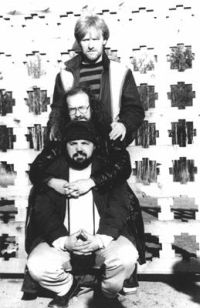Sergey Letov It was year 1980 when I heard Vladimir Resitskiy for the first time. His group gave a concert in one of the Moscow newly-built halls, I think, it was the Olympic Village concert hall. It was the first new jazz group live concert that I heard then (before that I only had disk records of the Ganelin trio). I felt dazed then. It was like nothing on earth! Against our imitative mainstream/jazz-rock this concert sounded supernatural. It was time before the perestroika , the very peak of standstill (and yet this time gave the most prominent musicians both in jazz, and in rock)… and that free jazz saxophone solo, that drive of rhythm section, free from the rhythmometer beat, those tensions and relaxations of musical cloth… were all so well unexpected.
The Archangelsk soloist and bandleader, Resitskiy then had an appearance of a rock (hard-rock, better to say, the new wave was still to come to Russia) musician – longhaired, bearded man. Perhaps it was not only the Willis Conover VOA Jazz Hour with Ornette Coleman that incited me to buy an alto-saxophone and start learning to play this kind of music, but that Archangelsk concert as well.
What impressed me first and most was a non-jazz energy of the group. Another noticeable feature was their team work, their one for all spirit. It was across the soviet jazz tradition, the soviet music, including academic one, tradition in general, cause, paradoxical enough, there were no place to collectivity in the soviet music. I’m not sure at all that onstage team work is what could be attributed to rock music (this thought was expressed by John Cage in the interview he gave to jazz trombonist Michael Zverin). It’s characteristic of good music in general. Under specific conditions of the soviet time, when individuality was suppressed, and technical virtuosity came in place of spirituality and inner resources, soloists bands substituted for bands. Anyhow, Resitskiy’s Archangelsk was a team of sole mates. Anyone of them could specify their esthetic creed equally well. The musicians sort of homed together, as a commune; they went in eastern combats, and ice-bathing, and so on. But, of course, I didn’t knew all that when I listened to their music for the first time.
Several years passed before Vladislav Makarov, a cellist from Smolensk town, offered to introduce me to Resitskiy. We met during the Autumn Rhythms festival in Leningrad, 1983. It was like meeting an idol. Leningrader Yefim Barban, a philosopher of the new improvisatory music, when criticizing my music records, especially the sound, suggested me to listen to Resitskiy’s play. I thought it rather odd, as the Resitskiy’s band did not at all follow the adverse aesthetics of nonidiomatic improvisation, advocated by Barban, and professed by his favorite musicians, Ivan Parker, Derek Bailey, and above-named Makarov.
Now, when one can strike a balance of Russian music the 20th century, it is evident to me that it was Resitskiy inimitable saxophone that sounded most up-to-date. One can’t tell for sure whether he took his color from somebody. Neither bebop traditionalism, nor academism, so characteristic of the soviet most famous new jazz saxophonists, like Vladimir Chekasin or Anatoly Vapirov, prevailed in his sound and manner. Resitskiy’s music didn’t show any sign of Coltrain jazz, peculiar of the soviet and, unfortunately, post-soviet jazz and rock. Though his sax sounded modern, he was not imitating any of modern western saxophonists (and Sergey Kuryokhin sometimes made me follow Ivan Parker, or Trevor Watts, or Roscoe Mitchell). Yet Resitskiy’s fine diverse technique stands him out of his contemporaries of the soviet time. He sounded harsh, masculine, yet I will always remember him playing ensemble.
His Archangelsk is a totally unique culture phenomenon, seen at the end of the 20th century. Archangelsk was the only stable band in Russia that played not imitative and nonacademic original music in the times before perestroika. They played their music openly, actively promoting their style. They even could give concerts in kolkhozes. Mysteriously, they played progressive music in the Archangelsk town central restaurant and gradually local public attuned their ears to Resitskiy’s music.
 |
| From left to right: Ivars Galenieks (double bass, Latvia), Vladimir Resitskiy, Gedeminas Laurinquavichus (percussion instrument, Lithuania), Oleg Yudanov (percussion instrument), Vyacheslav Gaivoronskiy (trumpet), and Sergey Letov. Jazz Days, Archangelsk. |
In middle eighties Archangelsk was among the first jazz bands that were allowed to join the philharmonic society. They were the only free jazz group that played their music so openly. The Vyacheslav Ganelin’s trio, and later Vladimir Chekasin’s and Vladimir Tarasov’s bands enjoyed advantages of the East-country mild atmosphere, that could not be compared with the Soviet Russia regime. Leningrad musicians were lucky to become part of an experiment, run by KGB. Thus, Kuryokhin with his Pop Mechanics joined the philharmonic system in 1989, at the very end of perestroika, and could be heard either in Leningrad only, or abroad. Archangelsk was a miracle, a symbol of transformation of the soviet reality, that took place in province, and that never happened in either of the capitals. Resitskiy reminds me of his landsman, Lomonosov, who succeeded trough his own intellect and efforts alone.
Trapped in the Red Grand Vladimir Resitskiy annually arranged new jazz festivals that attracted musicians from Japan, USA and Europe. Those festivals, held in a provincial town at the highest level possible, included the White Sea trips to Solovky, Solovetskiye Islands, with night jams carried out in the music saloon of the boat, and concerts given at the Bolshoy Solovetskiy island. Resitskiy and Co initiated not musical events only. Thus, at the end of eighties, they organized a Northern Dvina river trip from Archangelsk to Kotlas. In that trip, among others, took part a Sorbonne professor, and French feminist artists.
For the first time I attended the renowned Archangelsk Jazz Days together with TRIO trumpet player and showman Arkady Kirichenko in 1986. The TRIO third player, Arkady Shilkloper worked for the Moscow Philharmonic Orchestra and went on tours abroad all the time. It was cumbersome to play the TRIO repertoire without him, so we made up our minds to partner with other festival participants, say, Oleg Molokoyedov, who came to Archangelsk with Pyatras Vyshnyauskas’ band (Vilnius). After those improvisatory, somewhat successful theatricals with Molokoyedov, we were asked by Yury Kuznetsov, a piano player from Odessa, to accompany his romantic solo repertoire with a kind of show. In the course of our various stage activities, i.e. crawling across the stage with musical instruments in hands, or throwing birchen chucks, Arkady took his hair down and, taking a long run, jumped right into the open grand piano. He belly-whopped on the strings, thus muting part of them, which created and effect of John Cage cut prepared piano. For some time Yury Kuznetsov went on with his romantic poems, which sounded in somewhat prepared fashion now, but finally had to interrupt his play to help the well-padded Yury out of the piano. Poor thing was caught in the instrument and couldn’t get out of it. He only could murmur, Let me out of here! The thing is the piano microphone was right in front of him, and his call for help could be heard by everyone in the hall. To the wingding joy of the audience the evening of romantic piano ballades ended up with a scene of Yury being pulled out of the red grand piano.
The next day after the incident Vladimir Resitskiy was demanded to the Communist Party regional committee. He was asked to explain the implication of the performance. – A man got stuck in a red piano right onstage! He calls for help, they are trying to pull ‘im out of there, and can’t! You think we do not understand, what’s all that about? How dare you that sort of thing?
Resitskiy didn’t offer any excuses. He just shrugged his shoulders and commented meaningfully – – Moscow. Perestroika… A lingering pause followed his remark. The incident was over.
 |
| Vladimir Resitskiy, Arkady Kirichenko (sitting), Sergey Letov, and a jazz enthusiast from Minsk city. |
TRIO and Archangelsk took part in many different jazz festivals in East-country. Russian unconventional musicians were frequently invited to take part in that sort of events, held in Latvia, Lithuania and Estonia. New jazz was perceived as some sort of opposition movement, music of intellectual protest, which was in tune with the Archangelsk musical creed, yet was in discord with my own views. Though in eighties the artistic practices in Moscow haven’t yet made postmodernism a bad word, in province free jazz, experimental theatrical performances, liquid slides and creative music meant struggle. It was struggle against local Communist Party, KGB and Ministry of cultural affairs tsar’ky(1) , and later – struggle against patsany(2) and bratki(3) , who took their place. In that struggle international recognition, festival foreign guests and tours in foreign countries granted right to exist.
I recall on our disputes on music and not music alone that started in Switzerland. It was a reception in honor of the Soviet Avant-garde Jazz Festival participants. Swiss saxophonist Werner Ludi, who earned his living as a part time advertising agent, devoted his free time to aggressive nonconformist jazz music, which was his own protest against consumer society, besotting commercial music, and American pop-culture dominance. Both Werner and Resitskiy considered my reflections on a deeper and more profound way, a way of debunking those myths underlying the System (the way, which the founder of Moscow romantic conceptualism school, Andrey Monastirskiy and leader of DK group Sergey Zharikov followed), too abstract and highbrow.
______________________
1 kinglets (Russian)
2 guys (Russian)
3 brothers (Russian)
 |
| Vladimir Resitskiy, Arkady Kirichenko, and Sergey Letov |
At the very end of perestroika, in November 1989 we had a quarrel, and I cast the blame for it upon myself now, though there were some mitigating circumstances… After the Archangelsk international festival some of its participants – foreign musicians, TRIO and Archangelsk among them – went to Vilnius to take part in a jazz festival. The festival organizers could not accommodate the TRIO musicians. For twelve hours after our arrival we were carried in a minivan all over the city, and not a single hotel would offer accommodation to us, Russians. When they offered us to settle in a sanatorium for consumptives, I flared up and required to send us back home by the next train or airplane. I explained to foreign jazzmen how we were placed, made a call to Vladimir Tarasov, and it was only then that we were accommodated in a summer cottage, 25 kilometers away from Vilnius. I asked the Lithuanian organizers to put our concert, which was planned the next day, a day forward, so that we had time to rest, but they refused. Now I see it was not their fault, it was the general atmosphere in Lithuania. They even wouldn’t serve Russians in cafes. In such a bad mood I bewailed to Resitskiy, who was certainly no way to blame, one couldn’t speak of jazz brotherhood, cause there were first-class musicians and second-class ones (Russians). Thus, I told him of how Russian and foreign participants of the Archangelsk festival were offered separate cuisines, and mentioned some other facts.
Vladimir Resitskiy deeply resented my remarks and in warm blood he turned away from me. Besides, he forbid his group members to run with me. There were some of them who didn’t obey, and they were called down, as far as I know.
Several years later, during the Open Music Festival in Leningrad (I took part in it with the Russian-Ukrainian project www.letov.ru/rup.html, Resitskiy came into our make-up room. We toasted the end of our quarrel and Resitskiy told me he hadn’t accepted a Berkeley grant. He had been given a personal one, while he wanted it for the Archangelsk group as well. – What shall I do there? Play at Jewish weddings, like Levinovskiy? I wouldn’t go without my group, and we wouldn’t make it having one grant for all of us.
Why did he decide to speak with me of his choice? Why me? Now I think, perhaps he had learned somehow that Arkady Kirichenko, the former captive of a red grand piano, made up his mind to stay in America, and our TRIO had transformed into DUO. Arkady made his own choice in 1991; he left his career of a new improvisatory musician in the collapsing Soviet Union for bread buttered on both sides in the country of fat men. Perhaps, that was another of Arcady P.Freeman’s (that is how he started to call himself) arguments in our dispute, a practical joke so to say.
Middle nineties were the hardest time for music and musicians in Russia I ever seen. People lost their interest in new music; economic situation was also far from being up to the mark. We could hardly accustom ourselves to that. Yet I think it is the most ridiculous thing for a Russian nonacademic musician to expatriate. Perhaps, this is because when you live in the capital, you forget its advantages are beyond the reach of the rest of your countrymen.
Be as it may, Resitskiy didn’t accept American grant and jazz festivals in Archangelsk revived. Our TRIO (me, Yury Parfenov and Alexander Alexandrov) took part in one of them. I felt the situation worsened in comparison with what it was like in eighties. Resitskiy dissolved Archangelsk. His new group, Jazz Archangel, which I listened to in a church, was of a totally different format.
Archangelsk was in a state of discord. Somebody went abroad, others became businessmen. In his own authoritarian manner Resitskiy told me and Parfenov (the new member of TRIO) we mustn’t cooperate with his former group members. Rumor had it that Resitskiy conflicted with local criminal groups. The festival itself was held in a new place, on the other bank of Northern Dvina river. The usual trip to Solovetskiye Islands now was aboard a small river boat, which hardly labored the surge of the sea. On our way back we ran into a night gale. Beacons in the river entry were put out by the storm. We were ordered to move away from the shore, or we could take the ground and suffer wreck. Military helicopters were ready to start their rescue mission. The water temperature was +2°C, no way to survive. Lower deck was overwatered. Valentina Ponomaryeva, a singer that gave concert to the workers of Severodvinsk plant producing nuclear-power submarines, used the ship radio station to address the director of the plant. She asked him to permit our boat to enter the plant dock space and come along its building berth. We obtained such a permit in spite of the fact there were foreigners among us. Beside TRIO and Ponomaryeva, the boat had Vladimir Chekasin’s quartet (Lithuania), and musicians from Japan and Germany on board. This is how we survived.
Back in Archangelsk we drank to our providential escape. It was for the last time I drank with Vladimir Resitskiy.
In autumn 1996 Nickolay Dmitriev organized a concert in remembrance of Sergey Kuryokhin. Dmitriev invited me, Resitskiy, Oleg Lipatov, Abramov’s Class of Expressive Plastique to take part in this first concert in the memory of Captain. It was for the last time I played with Vladimir Resitskiy. And at the end of eighties we played together in the Kuryokhin’s Pop Mechanics, in Leningrad. Before that Resitskiy never worked with Kuryokhin, it was me who invited him to play in Pop-Mech. The sax section included just three instruments – Resitskiy’s alto-sax, tenor Vapirov and me, baritone. The Leningrad University administration specified Grebenshikov should not participate in the concert, so he appeared on the scene made-up and dressed in such a way that no one could tell it’s him. As the concert went on, Grebenshikov put off his clothes. Kuryokhin decided they would switch off the lights as soon as the audience would recognize it was Grebenshikov. But they didn’t get the idea; people suspected somebody had deliberately stopped the concert. The audience clamored angrily; there were shouts, Why didn’t they let you play? Somebody started to break chairs. It seemed to me Resitskiy was not that pleased with the provocation.
Beside that one time we took part in Pop Mechanics, the tree of us, Resitskiy, Anatoly Vapirov, and me, played together only once. It was in Zurich, at the abovementioned Soviet Avant-garde Jazz Festival, organized by Susanna Tanner. We played in Vapirov’s big band. The Archangelsk members made up their mind to buy a new KORG synthesizer, but they were short of money. Their new friend and associate, Werner Ludi, gave them the sum they wanted. Later in Archangelsk Resitskiy presented him with a Weltklang baritone saxophone. When Werner learned my own baritone was broken in the airport on my way back from the Zurich festival (I went to Moscow by a small Swiss Air plane and they wouldn’t allow me to take my instrument with me), he gave me that Weltklang.
Neither Werner Ludi, nor Vladimir Resitskiy are in being any more, and I still play that big saxophone and think of them both.
Leave a Reply